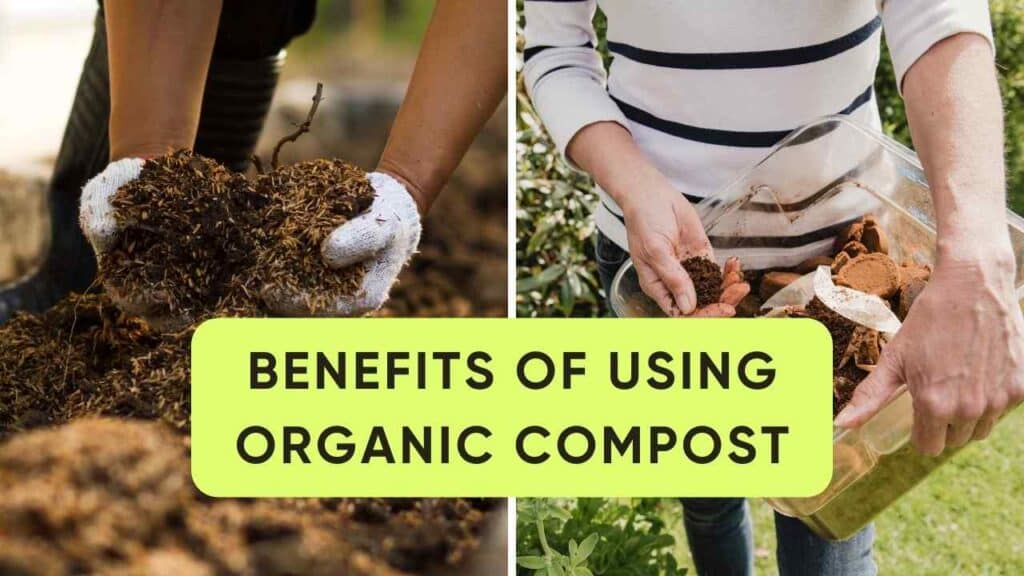Welcome to the world of organic compost, a true game-changer for your garden. Whether you’re a green thumb or just starting, this guide will unravel the secrets of composting, showing how simple scraps can transform your veggies and flowers.
Brief Understanding
First things first, what’s this buzz about organic compost? It’s a natural blend of decayed organic matter, like leaves, kitchen scraps, and grass clippings, turning waste into a nutrient-rich soil conditioner. It’s nature’s way of recycling, and guess what? It takes effort to get into.
Benefits of Using Organic Compost?

You’re in for a treat with organic compost. It’s not just good; it’s fantastic for your garden! It enriches the soil, keeps it moist, and helps produce some of the healthiest plants you’ve ever seen – talk about a triple threat! Plus, it’s an eco-friendly way to reduce waste. That’s like hitting two birds with one stone, isn’t it?
Creating Your Own Organic Compost
So, how do you start this magical process? It’s simpler than baking a pie! You just need a spot in your yard and some everyday waste from your kitchen and garden. But remember, not everything goes into the compost bin – meat and dairy are a big no-no!
Applying in Your Garden
Timing and technique are key. Spread the compost over your garden and gently mix it with the top layer of soil. Don’t go overboard, though. A little goes a long way, and your plants will thank you for it.
Organic Compost and Plant Health
Here’s the scoop: compost doesn’t just feed your plants; it also keeps them fit as a fiddle. It wards off diseases and keeps those pesky bugs away. Plus, veggies grown in compost-enriched soil are often more nutritious – talk about a win-win!
Troubleshooting Common Compost Issues
Do you have smelly compost or unwanted guests like flies? Don’t sweat it! There are simple fixes, like adjusting what you put in or how often you turn it. Composting is forgiving, and some trial and error makes you an expert before you know it.
Advanced Tips and Techniques
Feeling adventurous? Dive into advanced composting methods like Bokashi or worm composting. They’re like the VIP composting section, giving your garden an extra boost.
FAQs
1. What is Organic Compost?
Imagine if your kitchen scraps and yard waste could throw a party and invite a bunch of microorganisms to break things down. The result? Organic compost! This fantastic, nutrient-rich material is all-natural and super beneficial for your garden. Think of it as a multivitamin for your soil.
2. How Can I Make Organic Compost?
It is like brewing a magic potion for your garden, and guess what? It’s easier than pie! Start by finding a nice spot in your yard for a compost bin or pile. Toss in your veggie scraps, fruit peels, coffee grounds, eggshells, leaves, grass clippings – the list goes on. Just steer clear of meats, dairy, and oily stuff. Turn this mix occasionally, and voila, you’re a compost wizard!
3. Which Organic Compost is Best?
Ah, the quest for the best compost! The truth is, the best compost is the one you make yourself. It’s tailored to what you feed it, perfectly matching your garden’s needs. But, if you need more time or space, store-bought compost that’s well-aged is your next best bet.
4. What are the Uses of Organic Compost?
You can mix it into your garden soil, use it as a top dressing for your plants, or make a compost tea (sounds fancy, right?). It helps your plants grow strong and healthy and improves soil structure. Talk about multitasking!
5. Is Organic Compost Good for Plants?
Good for plants? More like fantastic! Organic compost is like a superfood smoothie for your plants. It’s packed with nutrients and helps improve soil health, which means your plants get stronger, healthier, and more gorgeous. It’s like giving your plants a five-star spa treatment.
6. Is Organic Compost Good for Soil?
You bet it is! Organic compost is like a soulmate for soil. It improves soil structure, helps retain moisture, and increases nutrient content. This means better drainage, less erosion, and a healthier garden. It’s like a match made in gardening heaven.
7. What are the Disadvantages?
Now, let’s be real. It’s not all sunshine and rainbows. Sometimes, if not managed
properly, it can attract pests or get a bit smelly. It also takes time and effort to make. Plus, if you add the wrong stuff (like diseased plants or weed seeds), you might end up with some unwelcome surprises in your garden. It’s all about balance and knowing the tricks of the trade!
8. What is the Difference Between Compost and Organic Compost?
Here’s the lowdown: all organic compost is compost, but not all compost is organic. Confused? Don’t be! It can be made from any decomposed organic matter. But for it to be “organic compost,” it must come from purely organic sources – kitchen scraps, yard waste, and such, free from synthetic chemicals. Organic compost is like the VIP, exclusive version of regular compost, boasting all-natural ingredients.
Conclusion
There you have it, folks! It’s a superhero for your garden. It’s easy, eco-friendly, and incredibly rewarding. Why not give it a shot? Your garden will be the envy of the neighborhood!
Why wait? Start your composting adventure today and see the difference in your garden. Share your journey with us in the comments. We’d love to hear about your composting wins and oopsies! Remember, the beauty of composting lies in its simplicity and the magic it brings to your garden. Happy composting!
Organic Gardening Tips: Nurturing Your Green Space Naturally
Pingback: Beyond the Bloom: Discover the Delights of Mini Gardening - Homebec